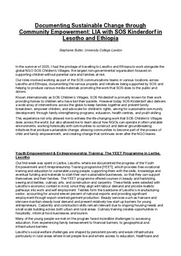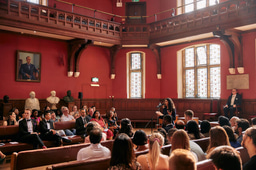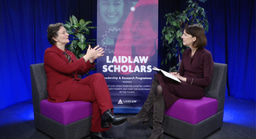Four lessons I learned on leadership

Firstly, I have learned to accept and to show my limits. This came with the realisation that I needed to have for myself the same compassion I have for others. When people I work with try their best and do not succeed or cannot complete the work they were supposed to do for a project, I am usually really understanding. I am naturally very empathic and do my best to respect people’s emotions and limits. These past months I have started to actively learn to do the same thing for myself, by developing self-compassion. I believe self-compassion is an essential part of becoming a good leader for three major reasons. First, being more understanding towards myself can make me even more understanding towards others. When I feel like I can work within my limits and the boundaries I set, I know I am less likely to become frustrated when a team member says they cannot do something because it is beyond their skills or they do not have time. Secondly, it helps me to finish quality work in time. For many years, I have always been working to achieve absolute perfection. Instead of opening new doors as I expected, it often limited me a lot. When working on multiple projects and deadlines, and trying to balance work and a healthy life and mindset, I have found it impossible to constantly aim for perfection. I used to work on deadlines until the absolute last minute, because I felt like somehow it could always be improved. But there simply is not enough time to do everything to the perfection considering the number of projects I am involved in – even when curating them carefully. Trying to achieve this perfection has sometimes been deeply detrimental to the rest of my work. Now, I have learned to let go sometimes when the work I produce is good enough. I still aim to do my best all the time, but I am now able to work on multiple projects at once, make sure I can meet all the deadlines, and have a balance life. Finally, learning to let go of an image of perfection had allowed me to reach for help more. I used to only dare to ask some well-crafted questions that would not show too much of my doubts and potential failures. I am now more comfortable showing my weaknesses and limits without feeling ashamed. It is truly a huge step forward for me. For example, recently I sent to my supervisor a draft of the text for my poster. It did not feel perfect, and I know that a few months ago I would have kept working on it until almost too late to meet the deadline by fear of his judgement. Contrary to my expectations, he was truly pleased with my work, and it allowed me to start working on the design of the poster directly. By daring to be openly vulnerable, I have entered a virtuous circle where I often receive more positive feedbacks than I expected and learned to better accept rejections when it happens. As a result, I keep daring to be more honest and vulnerable, which are values that are very important to me.
Secondly, I have learned that as a team leader, it is essential to learn to know my team properly. This implies understanding the group dynamics within the team as well as the individual personalities and drivers of each team member. While it may appear uselessly time-consuming to some, I believe it is incredibly valuable to keep the team cohesive and makes sure everyone adds as much as they can to the teamwork. I believe it is even more crucial when the work is voluntary as it is often the case in St Andrews’ societies and sports clubs. An exciting American research on volunteering showed that contrary to a widely spread belief, the best way to keep volunteers involved is not to make their involvement as easy and painless as possible. It is the opposite. They found that the best way to motivate volunteers is to give them tasks that can be challenging and makes the volunteer feel useful and impactful. Indeed, as volunteers decide to give their time and energy for a cause, they want to feel like they personally matter. Everyone wants to feel understood and valued, and it is extremely important for team leaders to remember that, both in voluntary projects and in teams and business more generally. In the two teams I have been leading recently, I have truly worked on that. Initially it was instinctive for me to want to know all me team members, and then I actively kept paying attention to their interests and drivers over time. I worked on knowing what each person loves to do, is good at, and the way they like to be led. Some like to be given a goal and a large amount on freedom on how to achieve it, while others prefer to have step by step precise guidelines for example. To better understand all members’ personalities and drivers I also made use of tools I learned during the Laidlaw leadership events, including the DiSC profiles. As a leader of the teams, it has been really interesting to learn to adapt my propositions and requests to these different profiles and I have deeply enjoyed it. It takes time and energy but really helps to make sure everyone stays motivated and produces quality work. It also truly helped me to better understand the role I like to play in teams and what I expect from team leaders myself. In these teams I lead, I am now working on making sure we have a clear structure, and that everyone in the team remains involved over the long term despite the covid-19 guidelines making many feel frustrated and limited. It is complicated as I sometimes lose a part of my drive too due to all these limits to the incredible projects we have worked on for months, but I am sure having learned about all team members is a true strength that is helping us to make it through.
Thirdly, I learned to dare to step up and create new projects, and to consider myself a leader. I used to wait for external validation to dare to step up as a leader. I thought it would have to come from someone else who would see potential in me and would give me the permission to feel and act as a leader. Now I have learned that I can decide for myself to feel and act as one. This really resonates with the talk Peter Harrington gave to Laidlaw Scholars about Rewarding Brave Thinking. He declared that no one has to wait for others to start calling them an entrepreneur to become one. One can decide to call themselves an entrepreneur. Recently I have started to feel a similar way about leadership. I have decided that I feel capable of generating change and of acting as a leader. It does not mean that people will follow me or that all my projects will be successful. I do not mean that I will try to be the centre or leader in all group projects I am part of. I have not become a self-centred and pretentious person convinced I have the knowledge to take the lead on any project, or that I am better than anyone. However, I have decided that I trust myself enough and have enough passion and experience to generate change and create new projects. This has been a true change in mindset. It feels really empowering and made me confident enough to start working on new projects. Last year, I started to create a team of people interested in working with me to organise the first St Andrews Climate Arts festival. I shared my passion and led by vision as we discussed in a recent Laidlaw leadership training. Quickly, ten people decided to join the team, and in a few months, we had secured enough support and funding to organise more than 14 activities over a weekend, involving professional artists and researchers coming from Eastern Africa. Unfortunately, we had to postpone due to covid-19. Nevertheless, most of the team now works together in the sustainable development society. It was truly amazing to see how much the team achieved, and to learn that I was able to lead them and generate that much change. I am now feeling much more confident in my ability to become what I consider to be a good leader: a person generating positive change in the world while caring about their team.
Finally, I have learned that being surpassed by others can be a goal and not a threat. I find that discovery especially meaningful as a sustainable development student in a world facing a global pandemic, an environmental crisis and numerous humanitarian crises. I have learned that it is essential to reflect on what motivates me. For some people, the main goal when starting and leading a project will be to achieve fame and recognition, while for others it will be to ty to improve the world as a whole – which can imply achieving a specific goal such as protecting an endangered species. When the motivation is turned towards the rest of the world and not just towards oneself, I believe it is possible to achieve so much more. Indeed, when someone is focused on themselves and the fame that can come through leadership, teaching others can feel threatening. However, if one’s aim is to improve the world, then teaching becomes a powerful tool to elevate new people who can help to achieve that exact mission. I recently took part in a talk from the marine biologist Dr Asha de Vos. She has been working for decades on the preservation of the blue whale, is one of the key researchers on that topic and was in the BBC 100 women in 2018. What really struck me during her talk was the decision she took to invest time and energy into spreading her knowledge and skills widely. She discussed how easy it can be to feel threatened when forming another person to do exactly the job one is doing. However, she explained that for her it was absolute evident to teach, as what is the most important to her is the protection of her homeland Sri Lanka, not her social status. I find it deeply inspiring, especially as too often in the field of environmental conservation we can see individual’s desires to be famous or in a position of power overpower the aim to preserve the environment. Deciding to spread knowledge and share a position of leadership is challenging. It takes self-confidence, an ability to trust others and to work with people. It can feel scary in a society where social status is so important. However, I believe it is deeply worth it. In French, we have the saying “the student will surpass the master”. I used to see it as a motivational quote for the student and a form of threat for the master. Now I believe that the student surpassing the master is not a failure, but an amazing achievement from the master and a beautiful legacy for the present and the future.
My Laidlaw scholarship is now coming to an end, and I am so grateful I have been able to take part in it. To say it concisely, it has been a great journey, I have learned tremendously, and I am more motivated than ever to change the world all together!





Please sign in
If you are a registered user on Laidlaw Scholars Network, please sign in